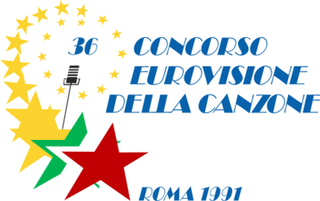
The Eurovision Song Contest 1991 was the 36th edition of the annual Eurovision Song Contest. It took place in Rome, Italy, following the country's victory at the 1990 contest with the song "Insieme: 1992" by Toto Cutugno and was organised by the European Broadcasting Union (EBU) and host broadcaster Radiotelevisione Italiana (RAI). The contest was held at Studio 15 di Cinecittà on Saturday 4 May 1991 and was hosted by former Italian winners Gigliola Cinquetti and Toto Cutugno.

North Macedonia, previously presented in the contest as the former Yugoslav Republic of Macedonia, has participated in the Eurovision Song Contest 20 times since its official debut in 1998. The country had attempted to participate in 1996, but failed to qualify from the audio-only qualifying round. The current Head of Delegation is Meri Popova.

Yugoslavia participated in the Eurovision Song Contest 27 times, debuting in 1961 and competing every year until its last appearance in 1992, with the exceptions of 1977–1980 and 1985. Yugoslavia won the 1989 contest and hosted the 1990 contest.
Yugoslavia participated for the last time in the Eurovision Song Contest 1992, held in Malmö, Sweden as the Federal Republic of Yugoslavia. The last Yugoslav representative was Extra Nena with the song "Ljubim te pesmama".
Yugoslavia was present at the Eurovision Song Contest 1962, held in Luxembourg, Luxembourg.
Yugoslavia participated for the first time at the Eurovision Song Contest 1961, held in Cannes, France.
Yugoslavia was present at the Eurovision Song Contest 1964, held in Copenhagen, Denmark.
Yugoslavia was present at the Eurovision Song Contest 1965, held in Naples, Italy.
Yugoslavia was present at the Eurovision Song Contest 1966, held in Luxembourg, Luxembourg.
Yugoslavia made their penultimate Eurovision entry in the Eurovision Song Contest 1991, held in Rome, Italy.
Yugoslavia was present at the Eurovision Song Contest 1967, held in Vienna, Austria.
The OGAE Second Chance Contest is a visual event which was founded in 1987 and is organised by branches of OGAE, the international fan club of the Eurovision Song Contest. Four nations competed in the first contest which took place in 1987. The contest was previously a non-televised event, but evolved over the years by the usage of video tape and later DVD and YouTube.
Norway was represented by Elisabeth Andreassen and Jan Werner Danielsen, with the song "Duett", at the 1994 Eurovision Song Contest, which took place on 30 April in Dublin. "Duett" was chosen as the Norwegian entry at the Melodi Grand Prix on 26 March, making it the third of four Eurovision appearances by Andreasson.
Jugovizija, Cyrillic: Југовизија, English: Yugovision, was the Yugoslav national final to select their entry for the Eurovision Song Contest, organized by the Yugoslav broadcaster Yugoslav Radio Television (JRT) and its subnational public broadcasting centers based in the capitals of each of the constituent republics of the Yugoslav federation: SR Bosnia and Herzegovina, SR Croatia, SR Macedonia, SR Montenegro, SR Serbia and SR Slovenia and also the broadcasting services of the autonomous provinces within SR Serbia: SAP Kosovo and SAP Vojvodina. The first subnational public broadcasters to compete in 1961 were RTV Belgrade, RTV Ljubljana and RTV Zagreb, while the others joined in the following years.
Yugoslavia took part in the 1983 Eurovision Song Contest held in Munich, West Germany. It was represented by Daniel who sang Džuli.
Yugoslavia was present at the Eurovision Song Contest 1968, held in London, United Kingdom.
Portugal was represented by Tonicha, with the song "Menina do alto da serra", at the 1971 Eurovision Song Contest, which took place on 3 April in Dublin. "Menina do alto da serra" was chosen as the Portuguese entry at the Grande Prémio TV da Canção Portuguesa on 11 February.
Yugoslavia was present at the Eurovision Song Contest 1963, held in London, United Kingdom.
Yugoslavia was represented at the Eurovision Song Contest 1969, held in Madrid, Spain, by an act that ended in 13th place.
Yugoslavia was present at the Eurovision Song Contest 1970, held in Amsterdam, Netherlands.


